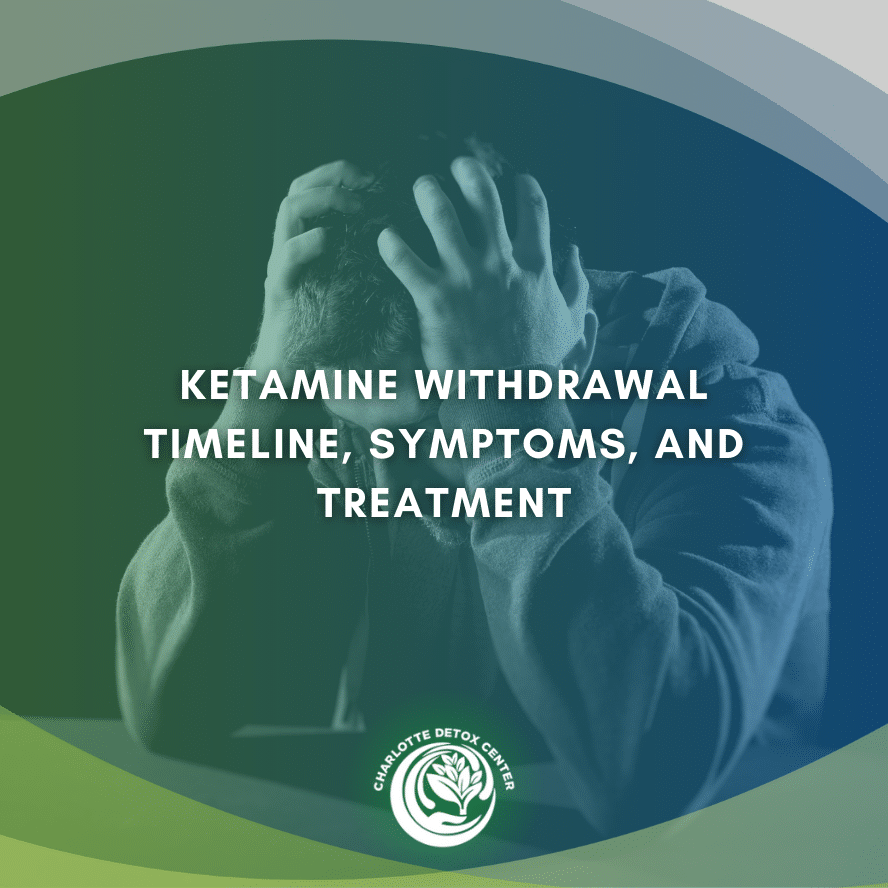Ketamine Withdrawal Timeline, Symptoms, and Treatment

Medically Verified: 2/1/24
Medical Reviewer
Chief Editor

All of the information on this page has been reviewed and verified by a certified addiction professional.
Ketamine is a dissociative and hallucinogenic drug that can make users feel detached from reality. In low doses, it can produce feelings of relaxation or produce a dreamlike state. However, in high doses, it can make users feel out of touch with reality, have hallucinations, and experience psychosis.
Ketamine may be used in medical settings as an anesthetic that is used locally or generally during surgery. In recent years, ketamine infusions have also been used to treat medication-resistant depression.[1]
Even though ketamine is used in some medical settings, it can also be abused illegally. People who abuse ketamine may inject, snort, swallow, or smoke the drug. Regular ketamine use can lead to physical and psychological dependence, and upon stopping the drug, users may experience symptoms of withdrawal.
If you or a loved one are struggling with ketamine addiction, you may be wondering what to expect during the withdrawal timeline and how the symptoms can be managed.
Symptoms of Ketamine Withdrawal
Detoxing from ketamine can be very uncomfortable, but it is rarely severe or life-threatening. Still, physical dependence on this drug can be difficult to overcome, so it’s best to seek professional medical support during the process.
Ketamine withdrawal symptoms occur because regular long-term ketamine abuse alters the function of opioid receptors in the brain. When the opioid receptors no longer have the substance they have become reliant on, they become overstimulated, causing symptoms of withdrawal.
The most common symptoms of ketamine withdrawal include:[2,3]
- Agitation
- Depression
- Rage
- Irritability
- Confusion
- Psychosis
- Poor motor skills
- Nausea
- Insomnia
- Shaking
- Rapid breathing
- Cognitive impairment
- Fatigue
- Hearing loss
- Drug cravings
- Sweating
- Chills
- Poor appetite
Because the psychological symptoms of withdrawal can be intense leading to mental stability, medical care is always recommended.
How Long Does Ketamine Withdrawal Last?
The ketamine withdrawal timeline varies from one person to the next based on their tolerance level, length of use, and whether or not they are also detoxing from other drugs. The duration of withdrawal can range from just 72 hours to 2-3 weeks.
Other factors that can influence how long ketamine withdrawal lasts include:[2]
- Age
- Weight
- Gender
- Body mass
- Metabolism
- Dosage of the drug
- Liver and kidney function
- Polydrug abuse and addiction
Ketamine Withdrawal Timeline
While the severity and duration of ketamine withdrawal can vary from one person to the next, most people’s symptoms follow a similar timeline.
Days 1-3
Symptoms usually begin within the first 24 hours after the last dose. Early symptoms include shakes, sleepiness, insomnia, anger or rage, depression, nausea, rapid breathing, and hearing loss. Symptoms will peak during this time and some people may experience hallucinations or psychosis.
Days 4-13
After day four, symptoms should begin to slowly taper off. Most people experience some symptoms for at least two weeks.
Days 14+
After two weeks, acute symptoms should be mostly gone and patients should be stable. Some psychological symptoms like dysphoria or drug cravings may linger.
Post-Acute Withdrawal Syndrome (PAWS)
Heavy daily ketamine users may experience PAWS. Psychological symptoms like depression and or dysphoria can last for several months. In most cases, PAWS can be managed with a clinical treatment program and peer support groups. Medication may be necessary for some situations to stabilize patients with psychological issues.
Detox Treatment for Ketamine Abuse and Dependence
The first step toward recovery involves detoxing from drugs and alcohol. Because tapering is typically not utilized when it comes to ketamine dependence, users stop using the drug cold turkey. This can result in intolerable symptoms of withdrawal and intensive cravings that can be difficult to endure alone. If patients don’t have a supportive, stable environment to detox in, they may be at risk for relapse or adverse side effects.
Medical detox centers can prescribe medications that can soothe symptoms of withdrawal. Detoxing in a medical detox center is the safest and easiest way to detox from any substance. These facilities can also provide 24-hour support and supervision, thereby minimizing the risk of relapse or severe psychological symptoms. Throughout detox, the patient’s respiratory function and heart rate will be closely monitored to ensure their safety.
After medical stabilization, patients can transition to an inpatient or outpatient treatment program where they engage in therapy and holistic healing activities to help them overcome their addiction.
Medical Drug and Alcohol Detox in Charlotte, North Carolina
Detoxing from ketamine can be difficult due to the unpredictable nature of the withdrawal symptoms, but careful monitoring and medical support can pave the way for a successful recovery. At Charlotte Detox Center, our luxurious drug and alcohol detox facility is equipped with a world-class team of physicians and addiction specialists who are eager to help you begin your recovery journey.
If you or a loved one are struggling with ketamine addiction, please contact us today.
References:
